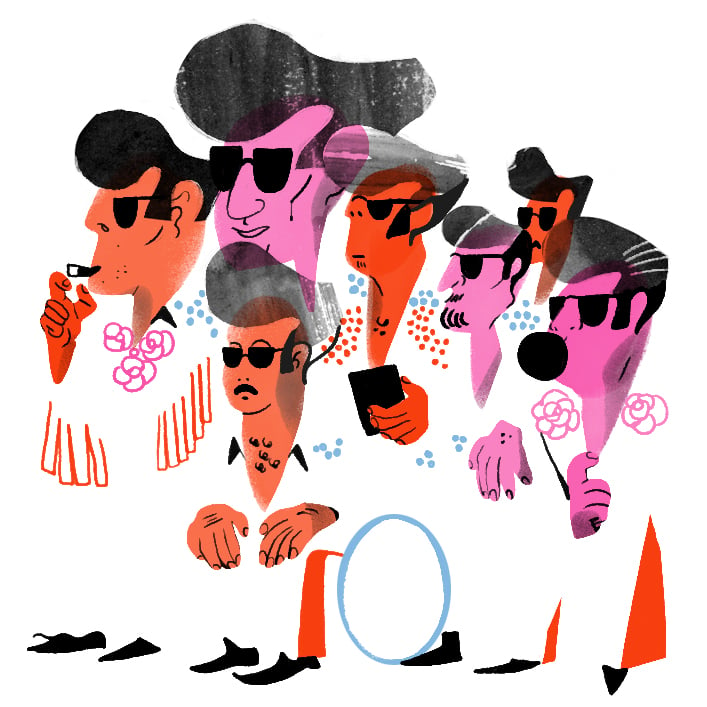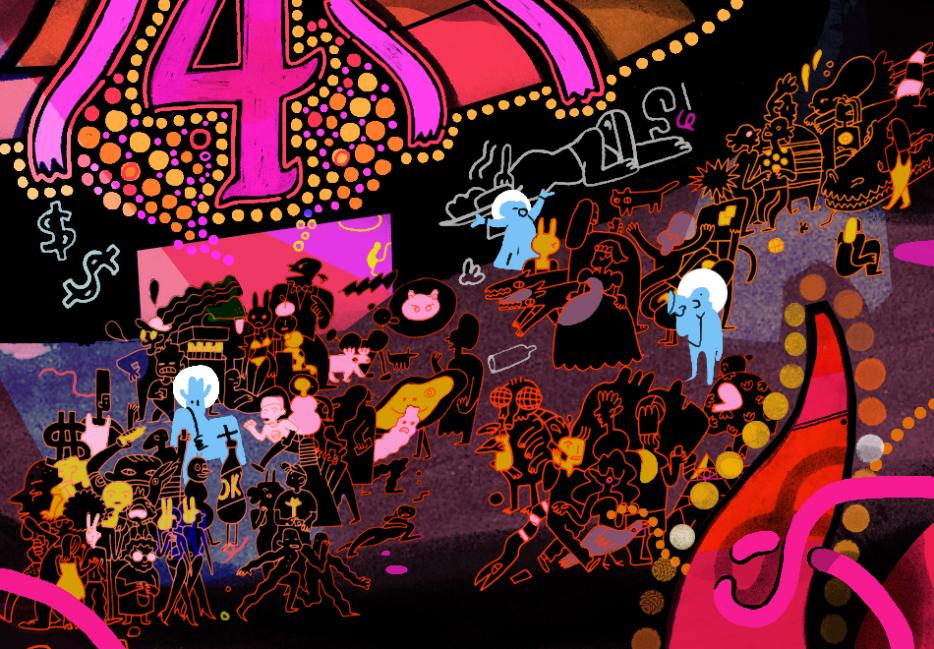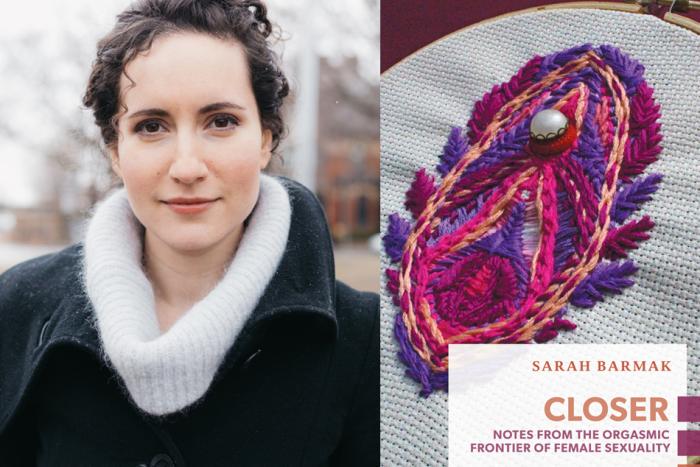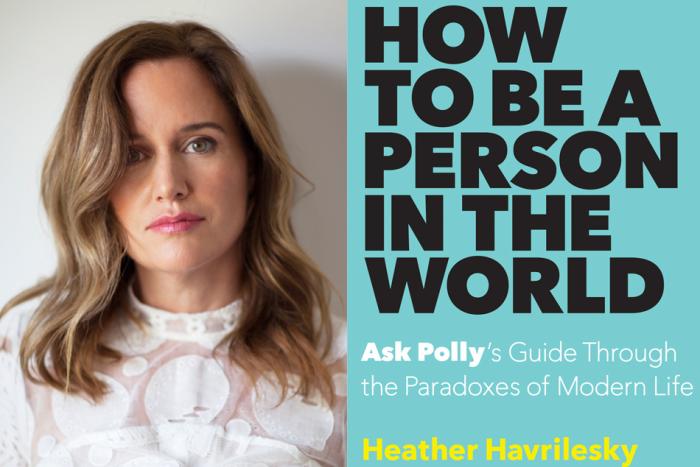It is sunset on the Vegas Strip. The angels are standing in their corsets, their feathered heels. There are so many Zach Galifianakises, with varying degrees of girth, varyingly realistic monkeys on their shoulders. A muscular blond man wears black tie without a shirt. There are two Minions from Despicable Me, waving tiny costume arms at passersby; next to them, the snowman from Frozen bows his head towards his tip jar. There are women in dominatrix leather—you can get your “naughty mugshot” taken, in handcuffs, for a tip—and infinite Elvises: thin Elvis, fat Elvis, Elvis in a wheelchair, Mickey Mouse Elvis, strumming his guitar. A clean-cut twenty-something with a board offers “medical marijuana” tours to people who don’t need medicine. A Hispanic man in his late forties, wearing an orange T-shirt that says GIRLS GIRLS GIRLS, passes out flyers for a strip club. People ask him questions. He says he speaks no English.
On the billboards, under the lights, across from the Paris-that-is-not-Paris (the Eiffel Tower, the Opera House, a quarter-size Arc de Triomphe advertising Monumental Sweets), a scrolling banner throws up seemingly unrelated snippets of text:
I USED TO BE A MODEL.
WE ARE ALL TIME TRAVELLERS.
HUSTLE OR BE BROKE
ARE YOU HAVING FUN YET?
At the fountains in front of the Bellagio Hotel, intermittently neon, the waters oscillate like women’s can-can-ing legs, rising above the few, parched trees dotting the hotel’s grounds. Everybody gathers here to watch the show—every fifteen minutes on Friday and Saturday nights—slurping through the 32-ounce daiquiris it is legal to carry openly. Tonight, the fountain is playing “Hey, Big Spender,” and at least a hundred people are craning their necks to see. They’re taking photographs. They’re tipping the Minions. The waters reach higher and higher, until the crash of them drowns out Shirley Bassey: “We could have a few laughs, laughs I could show you... good time! Would you like to have a... good time?” Everybody applauds.
Then Gary gets on the megaphone.
“Did you enjoy the show?” he asks, in a chewy Long Island accent. “The Bellagio—they gave you a free show. You didn’t earn it.”
Nobody stops. Nobody looks up.
“That’s salvation,” he says. “That’s God’s grace.”
“What the hell?” someone shouts. “Come on.”
The megaphone crackles. Gary gets louder—in his seventies, now, he admits he’s a little deaf—and keeps on going: “You’re proud of Sin City, as though sin had no penalty! Sin separates us from a Holy God."
He talks about the good news of Christ’s gospel. Then he talks about the bad news: “Unless you come to a relationship in Jesus Christ, you will spend eternity separated from God.” No response. “What if you don’t believe the Bible? Well, that’s the great thing about this country. You can believe the Bible’s not true.”
But that won’t change anything, when the hour comes. It’s like his sign says: REPENT OR PERISH.
“This is it,” Gary says. “We’re in the final stretch of the World Series—this world will pass away, Jesus Christ will come again."
Then, an afterthought. He nods at the Minions, who are still waving. “Tip the characters.”
He hands over the microphone. A German woman takes it: “Too many of us hear that God is love. But God is an angry God. God is angry with us every day.”
On the corner, a tall, broad man with a white goatee—his height only emphasized by his enormous cowboy hat—looks on in silence. TRUST JESUS, his sign says.
The music at the fountains starts up again, silencing them. Then they do the whole thing over again.
***
Gary Stanfield has been street preaching for six years. He moved to Vegas from Huntington, Long Island, after his wife died and he subsequently remarried. It’s been six years for Wivke Rockne, the German woman; sometimes her husband Roger, a blackjack dealer whose work has taught him the “sinful nature of greed,” joins her to hold the banner before his shifts at the Monte Carlo, where he tries to convert colleagues and gamblers alike as an undercover agent.
Dan Pflumme, who quietly hands out fake hundred-dollar bills with Christian messages printed on one side, has only been doing it for five months, just to get out of the house after his wife’s death, accompanied by his emotional service animal, a seven-year-old Bichon Frise called BJ who yelps at inopportune moments and jumps up and down his leg. They all have their own methods, their own techniques, their own Scriptural reference points, their own tracts, though they share a focus on generalities—God’s wrath, the coming Christ—over dogmatic specifics. They also share the microphone, switching off every ten or fifteen minutes.

She’s come to Vegas in search of a new start. She met Blake, with the dreadlocks, back in Denver; he’s her “Care Bear” now. He takes care of her.
She tells me she wants to tell me her story.
I take down her name.
“Rachel,” she says. Her hands are still shaking. “Like in the Bible.”
I meet Rachel and Blake at a café in the Cancun Resort, on the South Strip, near a strip of “weeklies” so dangerous my driver insists on waiting in the parking lot for two hours, unpaid, to ensure he gets me home safe.
By then, I’ve substantiated parts of Rachel’s story. She’s Rachel DeAnn Tessean. In 2004, when she was 16 and pregnant for the first time, she appeared on Dr. Phil, after her mother, citing concerns about the virtue of her younger daughters, placed her in a home for unwed mothers two days after she admitted her pregnancy. She gave that daughter up for adoption at her family’s behest.
A decade later, and Rachel’s lost custody of her three younger children—products of an abusive marriage—to her aunt. She’s been in and out of halfway houses and rehab centers; she’s done “modeling, stripping, porn.” She’s been a “moneybag” to drug dealers she’s dated—abused by rival gang members as retaliation when they came up short on money. She has seizures, sometimes—a result of repeated head trauma.
Seeing the preachers’ signs on the Strip set her off. “Las Vegas, it’s like the boob of the world—everybody’s like a vampire just sucking on it, you know? All the evil that can go on here. And people go back to their homes in different states—they probably go back to church. It’s called hypocrisy.” Her relatives were religious Christians, after all, and look at how they treated her. “All Bible-thumpers and Baptists and Evangelists, and they got their thing going on and they all got their six figures in their bank account, and their cars and their houses, and they go to church every Sunday.”
Through all this, Rachel believes God has brought her here. She prayed for a miracle back in Denver and she met Blake.
“I call him Care Bear, no one else calls him Care Bear but me, ’cause he’s the biggest teddy bear. But you know what, my teddy bear isn’t just something I cuddle, he actually cares. Unlike...” Her voice tightens. “And that’s something about Christianity: People have to actually care. You can’t just say you’re a good person. You have to actually feel the emotion. You can’t just do good things and then think that’s going to make you look better. “
She grabs Blake’s hand and squeezes it.
Blake nods.
He’s on a mission, too. Back in North Carolina, Blake was a recreational cannabis user, occasionally experimenting with hallucinogens in search of a higher consciousness—that “unconditional happiness toward where I can love everybody.” What Christians called in Greek agape.
Two months ago, he had a diethyltryptamine-induced religious vision, and now believes God wants him to go to California.
Blake grew up wealthy, the grandson of a town mayor with millions in the bank; he received a house, bought and paid for, for his eighteenth birthday. He was sexually abused throughout his childhood, bounced around from relative to relative, and claims to have been, at the nadir of his depression, a full 800 pounds.
Then a woman at the nursing home at which he was temping spoke in tongues, and everything changed.
“I can’t understand anything she’s saying, I just know she’s talking. She goes around to me, and she’s like, Blake. And all of a sudden I hear everything she’s saying. Blake, I was saving the best for you, because God has something special for you.”
Then he understood everything.
She had three prophecies for him: That he would find somebody that truly loved him; that he would lead thousands of people in the name of God; and that he would die before the fall of Babylon.
“By the third prophecy, I could never question God’s existence ever again. The baptism of the Holy Spirit. It’s whenever the idea of God comes upon you and you could never question God’s existence ever again.”
He lost weight—he’s stout, now, but nowhere near obese. He began experimenting with hallucinogens. He began experiencing those paroxysms of love that led him to his vision of California.
It strikes me that it is the first time, since I have arrived in Vegas, that somebody has given me an account of faith that actually details the moment everything changes. It is the first time somebody has told me what finding God is really like.
This God is not the God of Shadow Hill Baptist Church. It is not Jim Webber’s God, either. Together, Rachel and Blake have assumed their own religion—cobbled from passages of Scripture, from their visions, from prophecies and drugs. God has brought them to each other in their brokenness, they say. They have suffered; with each other, they are no longer suffering, at least for a while. Soon, they tell me, they’re heading to Slab City, California, a famous off-grid anarchic desert campsite known as the “last free place” on earth.
“Freaks of nature,” Rachel starts to grin. “All people of all walks of life, rich poor, middle class from all over the world—that have dreads, and don’t have dreads, or are Indian or native or not. Black or white, men or women; it doesn’t matter. There’s not going to be one fight. There’s not going to be anybody starving, or anybody saying, where’d you come from, or why are you here? Why don’t you get your kids back, Rachel?”
She has her Care Bear now, she says. He’s more of a brother to her than her real family ever was.
And she has her faith. Not in her mother’s God, not in any God in any religion she’s familiar with, but in the God she came to know in darkness.
“I mean—I can’t tell you how many times I’ve been by the railroad tracks, by myself, in army boots, like crying. Not even crying, screaming at the top of my lungs. Like, really God? Like really? And the only thing I could think of was to thank Him, and I thanked Him again: that I did not have my children with me, that my children could not see me screaming for them at a railroad. I’ve prayed, I’ve never lost faith, I’ve been put in bad situations, but I always was like, okay, I’ll figure it out somehow, some way. This is what God had to teach me: how to love when I have nothing to love at all. Or no one to love at all.”
Rachel and Blake are both crying.
“At least I don’t have to go on the Dr. Phil show again to talk about what I need to talk about,” she says, softly, to Blake. “I found you.”
It is sunset on the Vegas strip. A drunk, homeless woman gives the street preachers the finger. An Elvis passes by on a motorized wheelchair. The Minions are putting on their plush, cartoon heads. The snowman from Frozen is putting out his tip jar. The angels wrap coats around their feathers, their lingerie.
God consistently uses the imperfect to minister his perfection.
I’ve asked Rachel and Blake to write me, to let me know they’ve made it to Slab City safely.
Gary is setting up his megaphone.
Jim is already standing, so still with his sign. He is still wearing his cowboy hat.
Tonight we will be like Christ, again. We will preach in the highways and the byways. We will preach to the unbeliever. We will preach to the sex worker, to the mother who weeps in heaven because her children are no more. We will preach the good news in the city of sin.
Jim stands there with his sign, a few hours more.
“Couldn’t agree with you more!” Someone grabs Jim’s hand, envelops it in a handshake. “Hey, pray for this guy I met…he’s from Miami. He said he was a Jew—what was his name? Kippin? He’s going to hell.” He gives a little laugh. “If Jesus comes today he’s going to hell.”
Once he finds out I’m a journalist, he gives me his full name at once. “Todd Harris.” He tells me he admires what Jim is doing. “He’s not, like, yelling, for one thing. It’s like, chill, chill, man. You don’t have to put it in people’s face. Jesus, he met you right where you were at!” He tells me he’s in town for work: he’s starting a “relational routing center”—a kind of bespoke rehab service—called Total Life Change. “We wanna help people help themselves. Meeting them right where they’re at.” He leans straight into my recorder. “Total Life Change. Todd Harris. Just starting this business—it’s going to go!”
Then he vanishes into the night, which is so bright with neon it might as well be dawn.
Jim and I stand alone, among the crowds. He is meditative, still.
“You know, there is nothing, in my opinion, that is more satisfying than dealing with human beings and what is going on in their lives. And people are very complicated, you know.” Sometimes it’s not even about converting them. Sometimes you just talk to somebody, you learn their story, you gain their respect. You touch them, in some way, and then maybe they remember you, when they least expect it, and maybe then they find something that looks like grace. “And that’s the object of what we’re looking for.”
“Hey, Big Spender,” is starting up again. The water show is beginning. The crowds gather. Someone is taking a selfie, making sure to get Jim’s TRUST JESUS sign in the background.
“Here, in this city,” says Jim, “this city that personifies itself as Sin City, in the midst of that hub, what greater honor, what greater privilege could I ask for in this life than to be a beacon of light in this darkness?”
Down the Strip, Gary is fiddling with his banner.
“We could have a few laughs, laughs I could show you a ... good time! Would you like to have a ... good time?”
The fountain show crashes to its climax once more. Everybody applauds.
Gary gets on his megaphone.
“Did you enjoy the show?’”






